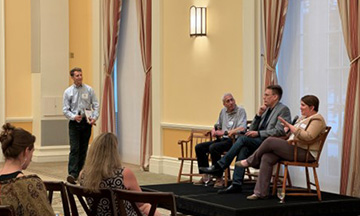Are you interested in connecting with other alumni leveraging their careers to combat climate change? BEI invites HBS Alumni to join our Alumni in Climate Networking Series for a chance to connect with local alumni to discuss ideas, trends, opportunities, and challenges at the intersection of business and the environment. Email bei@hbs.edu to learn more about upcoming events.
On July 17th, BEI convened students and local alumni on the HBS campus to discuss ideas, trends, opportunities, and challenges at the intersection of business and the environment. This continuation of our climate networking series featured a panel of leaders in climate tech, including Mitchell Goldstein (CFO at Commonwealth Fusion Systems), Pasi Miettinen (CEO at Sagewell Inc.), and Emily Stoler (Principal Scientist, Sustainable Materials at the Wyss Institute at Harvard University) and was moderated by BEI Faculty Chair Professor Mike Toffel. Over 40 guests came together and connected with one another over refreshments in the Spangler Williams Room.

Our panelists kicked off the evening with an overview of their companies and the positive impact they hope to have on climate change. Solutions ranged from Commonwealth Fusion Systems use of magnets to build smaller and lower-cost fusion systems to Sagewell’s use of data analytics to deliver solutions for energy efficiency to Wyss’ ability to bridge the gap between academia and industry to build a more sustainable future through technology innovation.
Moderator Mike Toffel explored different topics with the panelists, who offered their perspectives on the trends they’re seeing, as well as the challenges and opportunities that they face. Mitch Goldstein likened electricity to the early telecom industry, confident that we are in a “relatively early stage of massive change and what we see in 10 or 20 years will be unimaginable – in a good way.” Mitch noted that even when “working with proven technology, the execution and implementation is the hardest part” and that “having an open mindset is critical.”
Emily emphasized the need to collaborate and the importance of having both an economic and environmental angle to their projects: “The technology needs to be developed with a business plan in mind. There needs to be collaboration and we need to bring a lot of people to the table early on to solve the problem.”
Pasi explained how Sagewell leverages the 40+ small municipal utilities across Massachusetts to look closely at what works and what doesn’t. Pasi is optimistic: “This is a very exciting journey that we are on and it comes with challenges. We are seeing the positive impacts but also the shortcomings – I see this as an opportunity.”
The evening ended with ample time for networking and Q&A from the audience, who engaged the panelists on topics ranging from pricing to the role of incumbents to the impact of the upcoming election on the climate tech industry.

